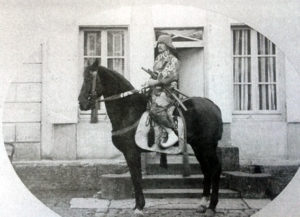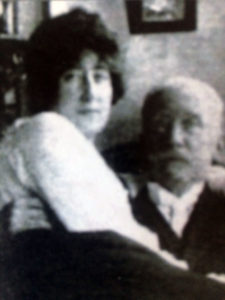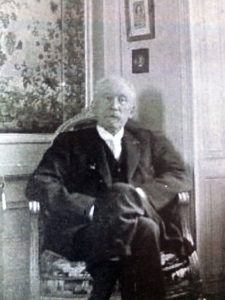Louis Pierre Dillais, a colonel of infantery

Louis Pierre Dillais, dressed as a samurai during his travel to Japan
Father of Marcel Louis Dillais and second son of lawyer Victor-Stanislas Dillais and of Pauline Caillebotte, Louis Pierre studied at Louis-Le-Grand. He became a Bachelor of Letters in 1870, and subsequently was admitted at the Polytechnique School (class of 1872-1873). He was first assigned to the 22nd regiment of artillery, with the rank of captain, in the commission of powders. In 1880-1881, he obtained a leave and went on a world tour, which he had to cut short. From these travels, he left a very laconic diary and a number of letters to his parents and his brother. He returned enamoured with Japanese culture, being deeply impressed by the army of this country, which was often overlooked by Westerners. He took back his position as a staff officer, as head of the artillery of the 3rd army corps, was promoted to squadron leader in 1895, then to lieutenant-colonel of artillery in 1903; he retired the following year. He married Charlotte Marion in 1887 and they lived together at Versailles (Lambinet Hotel, currently Museum of the City of Versailles). The young woman gave birth to three children, but died prematurely in 1894, leaving behind a grieving widower: having never remarried, Louis Pierre Dillais would daily visit the grave of Charlotte. He wrote in his will that he wished, of course, to be buried in the cemetery of Versailles next to his beloved wife. He also wanted that her photograph be placed in his coffin.
In 1903, Louis Pierre Dillais left Versailles for Auteuil, where he bought the building at 92, rue de Ranelagh (currently housing the offices of the Order of Malta), referred to as the Ranelagh in the family (sold in 1984). He raised his children there by himself: his daughter said that he had “been both a father and a mother to them”. He spent his retirement between Paris and Biarritz and died at the age of 67; Knight of the Orders of Leopold (Belgium 1880), of Dannebrog (Denmark 1881), of the Legion of Honor (1893), and the Order of the Lion and the Sun (Persia, 1900).
Testimonials:

Louis Pierre Dillais was very fond of his daughter Jacqueline. “My darling little girl” (he wrote in a letter of October 22, 1916). “Since yesterday and despite your urgings, I have thought quite a lot about you. I think this is a bad habit that I will keep until my dying day. This is no news to you, but you do not expect novelties from me, knowing the dullness and sadness of my life. I kiss you lots of times.”
He tried to convey to his children his uprightness and moral strictness, as shown by this account, reported by his daughter. “My mother, who spoke fondly of her father, told us that an old friend, finding himself very advanced in age and childless, had wished to make Colonel Dillais his legitimate heir; the latter had refused indignantly. Yet his friend stubbornly insisted and included in his will the minor children of my grandfather (who could not legally oppose this), and they did indeed receive the inheritance. But my grandfather, being determined not to receive anything in exchange for his friendship, paid an equivalent amount to the nephews of the deceased, who had always neglected their uncle. They were bewildered by such disinterestedness.”
Kindness was one of the main traits of character of Louis Pierre Dillais, who often said that it is better to give alms to a false beggar than to overlook a real one; he also said that you should never hit a woman, not even with a flower.
World tour of colonel Louis Pierre Dillais

Colonel Louis Pierre Dillais, retired at Auteuil, in his house in Ranelagh
